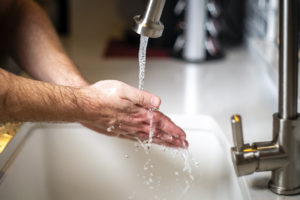
Frequent handwashing and sanitizing put sensitive skin through a beating. Lathering up with soap or the dryness of alcohol-based sanitizers can lead to irritation, itching, dryness, cracking, or worse.
So, what the heck are you supposed to do? Can you keep your risk for a viral infection down and avoid eczema flare-ups?
It’s possible, but it’s not perfect.
- When you can, use soap instead of sanitizer: When you use soap and water, then immediately apply moisturizer, you can offset the drying effects from the wash. Always carry a travel-tube of moisturizer.
- Stay away from antiseptic/antibacterial soaps: These might contain alcohol or ingredients that can exacerbate dryness.
- Moisturize, moisturize, moisturize: After washing, pat hands with a towel so they remain slightly damp. Then add a generous amount of moisturizer, being sure to cover your hands.
- Wear gloves when cleaning: Soaps and household cleaners can irritate the skin, so use gloves when cleaning and sanitizing the surfaces in your home.
- Sterilize containers: Remember that viruses can easily transfer between surfaces, so remember to sterilize your moisturizer travel tube. Also, your hands should always be clean and slightly damp before applying moisturizer.
You might not be able to completely eliminate the challenges of too much hand washing, but you can lessen the risk for eczema flare-ups. These techniques can help reduce the risk of infection and keep your immune system strong.
Because eczema is an inflammatory condition, taking other steps to boost immunity may help. Eating a healthy diet rich in vitamins and minerals, and limiting processed foods, might help keep inflammation at bay and limit painful symptoms.